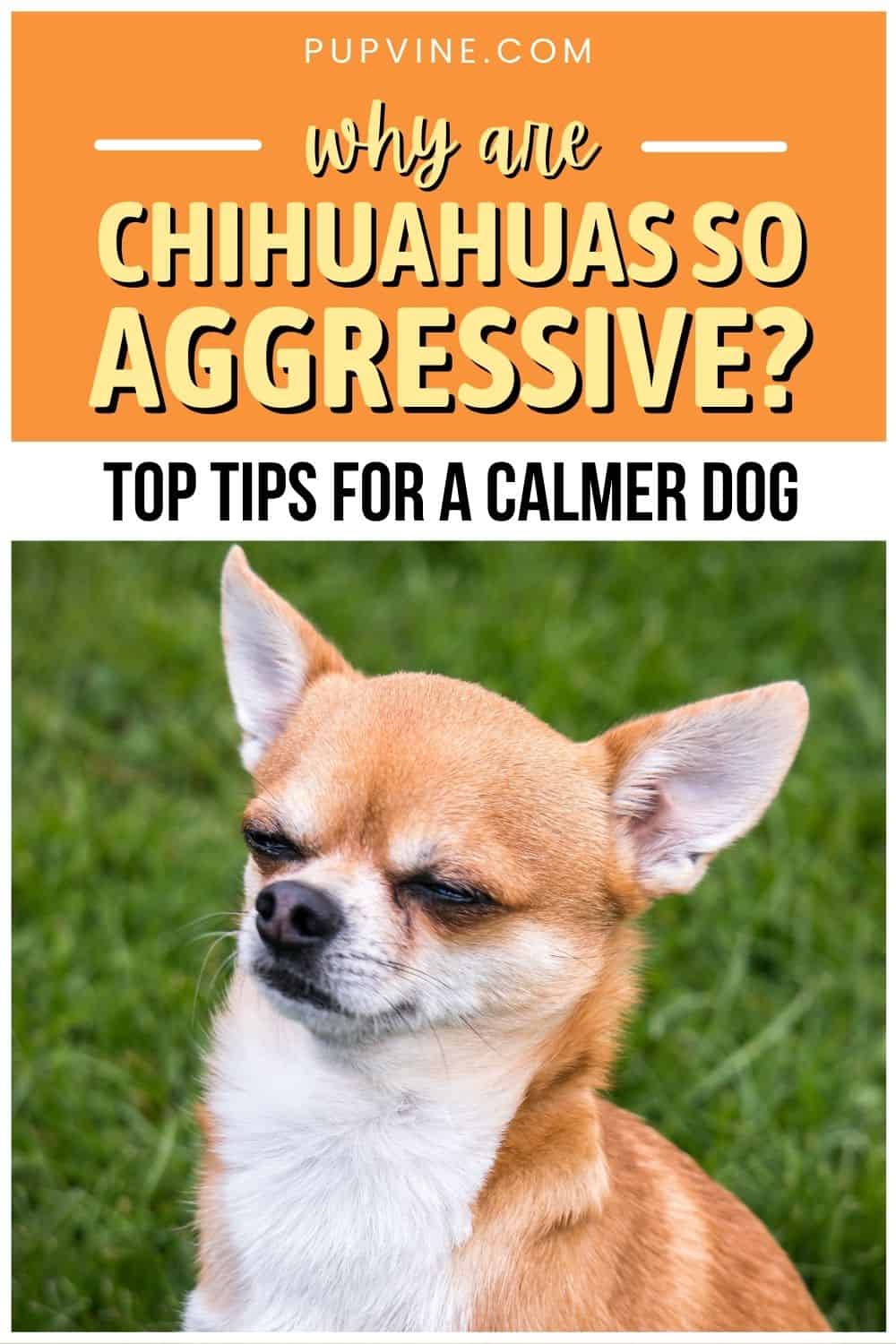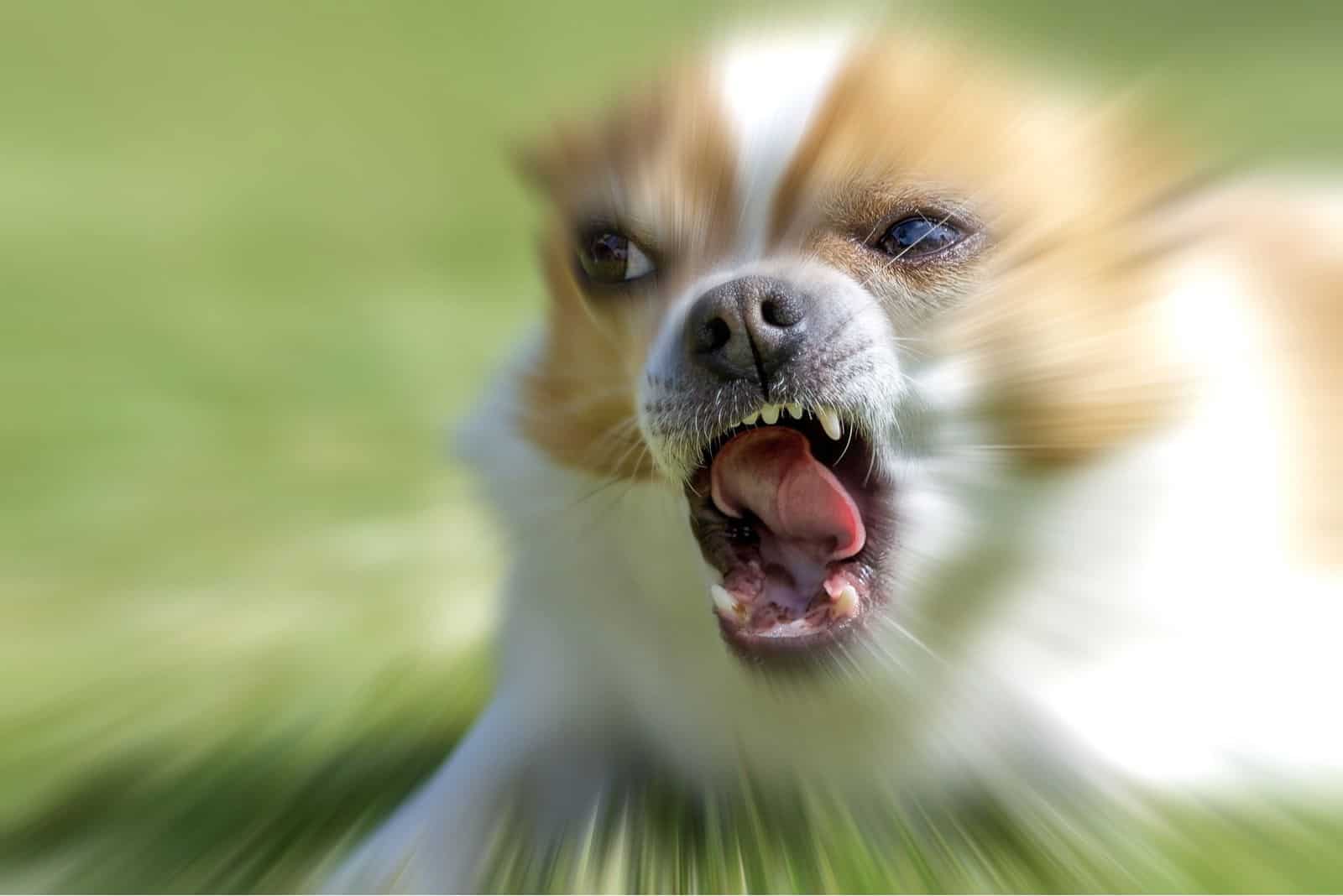Why are Chihuahuas so aggressive? Well, there are many reasons why dogs might seem to be aggressive at times. Even the most placid dogs might show aggression because of pain, fear, hunger, a history of abuse, anxiety, etc.
But the fact that so many people are asking this question about Chihuahuas seems to indicate that this little dog has a real problem with aggression. So, is this a true reflection of the breed?
Many Chihuahua owners will say otherwise! They’ll insist that their pooch is the sweetest, gentlest dog on the planet, and there’s no reason to doubt this.
However, others will agree that there’s a problem, which matches with many studies suggesting that 90% of Chihuahuas display moderate aggression.
We’re going to investigate this tiny pooch to find out all you need to know about aggressive behavior and finish with some tips to reduce aggression in your beloved Chi.
What Do We Mean By Aggressive Behavior?

Before answering the question, why are Chihuahuas so aggressive? we have to understand what is meant by aggressive behavior.
Dogs can show aggression in several ways: growling, barking, snarling, nipping, biting, etc. However, these are all normal, natural ways for dogs to communicate.
It isn’t their fault that they can’t speak to us in our own language! Obviously, biting and nipping should be stopped as far as possible, but it’s neither right nor fair to label a dog as being aggressive without first looking at the reasons for this behavior.
One way to understand what’s going on is to observe the dog’s body language. A lot of pet owners get this wrong, so let’s take a moment to study this:
• The tail – We often assume that the tail wag means a happy dog, but this is not always the case! A wagging tail is simply a sign that the dog is emotional. If it’s rotating like a helicopter, then your dog is happy.
If it’s wagging slowly from side to side, with the dog almost bending itself in half, then your dog is relaxed. However, if that tail is twitching rapidly, then your dog is agitated about something.
The position of the tail tells us whether the dog is feeling fearful and anxious (positioned low or between the hind legs) or is feeling confident and aggressive (raised high).
• Hackles – When the hackles (the hair on the back of the dog’s neck running down to the tail) are raised, this is a sign that the dog is aroused. It can mean that they are upset and afraid, but it can equally mean that they are excited about something. The trick is to notice whether this is accompanied by any other signs of aggression or fear.
• Expressions – Dogs have many facial expressions, just like us! However, some of them mean different things. Yawning is a sign that the dog is tense or stressed. They might lick their lips when they are feeling anxious.
Smiling can be a hard one for some people to read, as the dog’s teeth are on view. However, there’s a vast difference between this and bared teeth that are ready to bite!
• Posture – One sure sign of aggression is a dog that appears to be putting all its weight on its front legs in an attempt to look bigger. This is especially so when the hackles and tail are raised.
On the other hand, a dog that lies on its back is showing submission. Or, when they ‘bow’ to you, half lying down with their back end in the air, it’s a sign that they want to play.
• Eye contact – In humans, this is seen as a good thing. In dogs, not so much. Direct eye contact can be seen as a challenge to dogs that are already feeling aggressive. Dogs that are uncomfortable with a situation will always look away. Anyone who has told off their pooch for bad behavior will know this look!
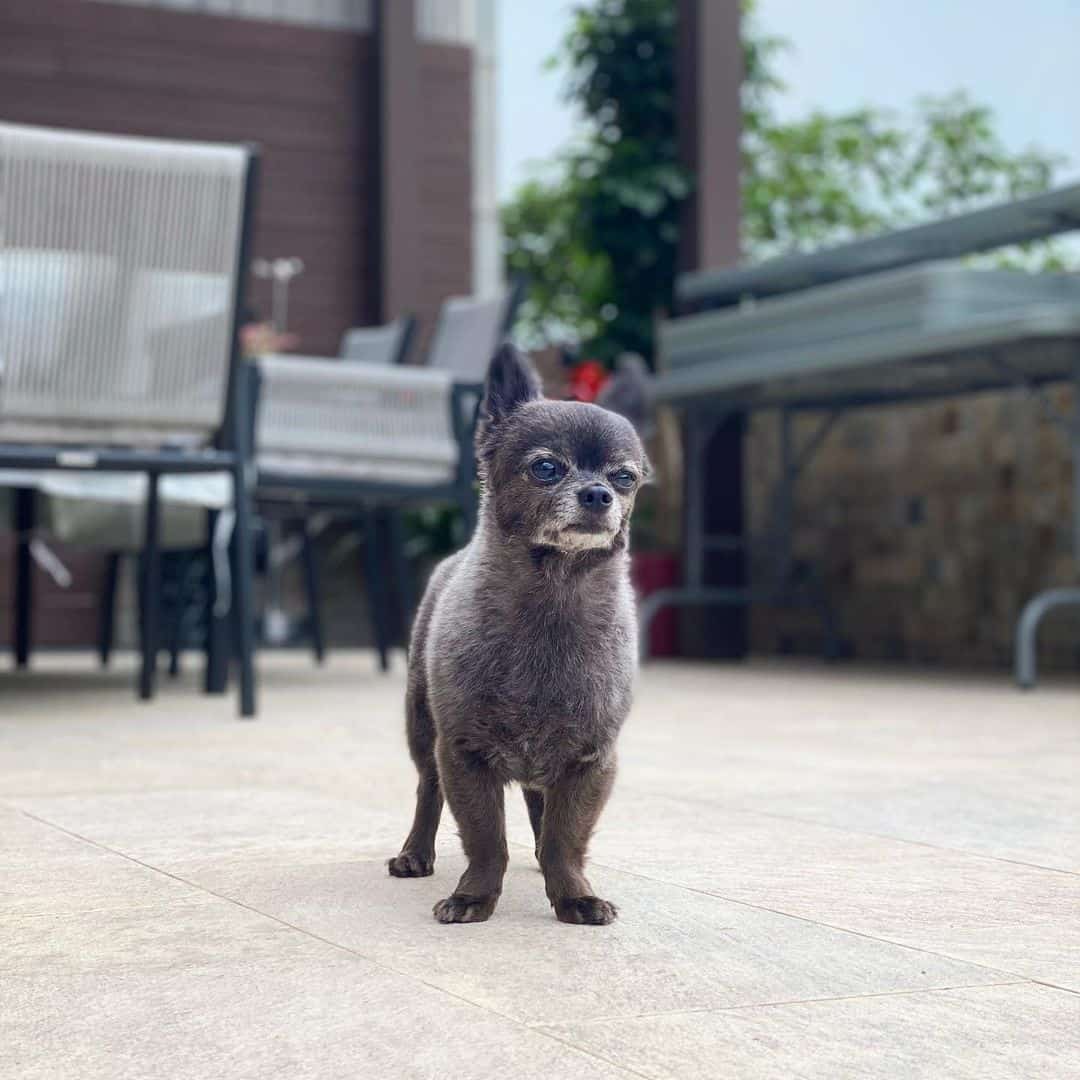
Photo from @angrychiihuahua
The key here is to look for a combination of some of these signs to determine whether your dog is being aggressive or not.
We’ve examined body language, now let’s look at some other examples of potentially aggressive behavior.
A dog that barks at a passing stranger while out on its leash isn’t really aggressive; it could be simply protecting you.
However, if they bark and snarl excessively, straining at the leash in an attempt to bite the stranger, that’s another story.
Then again, if this is a one-off event, it’s not likely to be a regular thing and is nothing to worry about. But if this happens frequently, then your dog has a problem with aggression.
Aggressive dogs can be extremely intimidating, as anyone who has encountered something like an angry Pit Bull Terrier will confirm. Some dogs are immensely powerful and are capable of inflicting severe damage when they want to.
By now, you’ll have an image in your mind of a snarling, barking dog, with its ears flattened back against its skull, its sharp teeth bared, eyes flashing as it stares in your direction.
This is clearly aggressive behavior. In dogs the size of Pit Bulls, or larger, this means bad news for anyone or anything on the receiving end. But an aggressive Chihuahua? That’s surely nothing to be worried about, is it? They’re so tiny!
The trouble is, it isn’t just about the size.
In reality, nobody wants a dog that’s angry and defensive all the time. We certainly don’t want a dog that snarls and barks or even tries to bite us, our guests, or other dogs and animals. Chihuahua aggression is no joke and is just as much of a problem as in any other breed.
The main thing to keep in mind is that an aggressive dog is not a happy dog. Our job as dog owners is to monitor any aggressiveness and look for the causes, then find ways to help our furry friends to find some peace.
So, when we talk about aggressive behavior, we mean that a dog is constantly barking and snarling or even snapping and biting. It might be directed at you, other family members, other pets, people visiting your home, or other dogs when out exercising.
Why Are Chihuahuas So Mean?
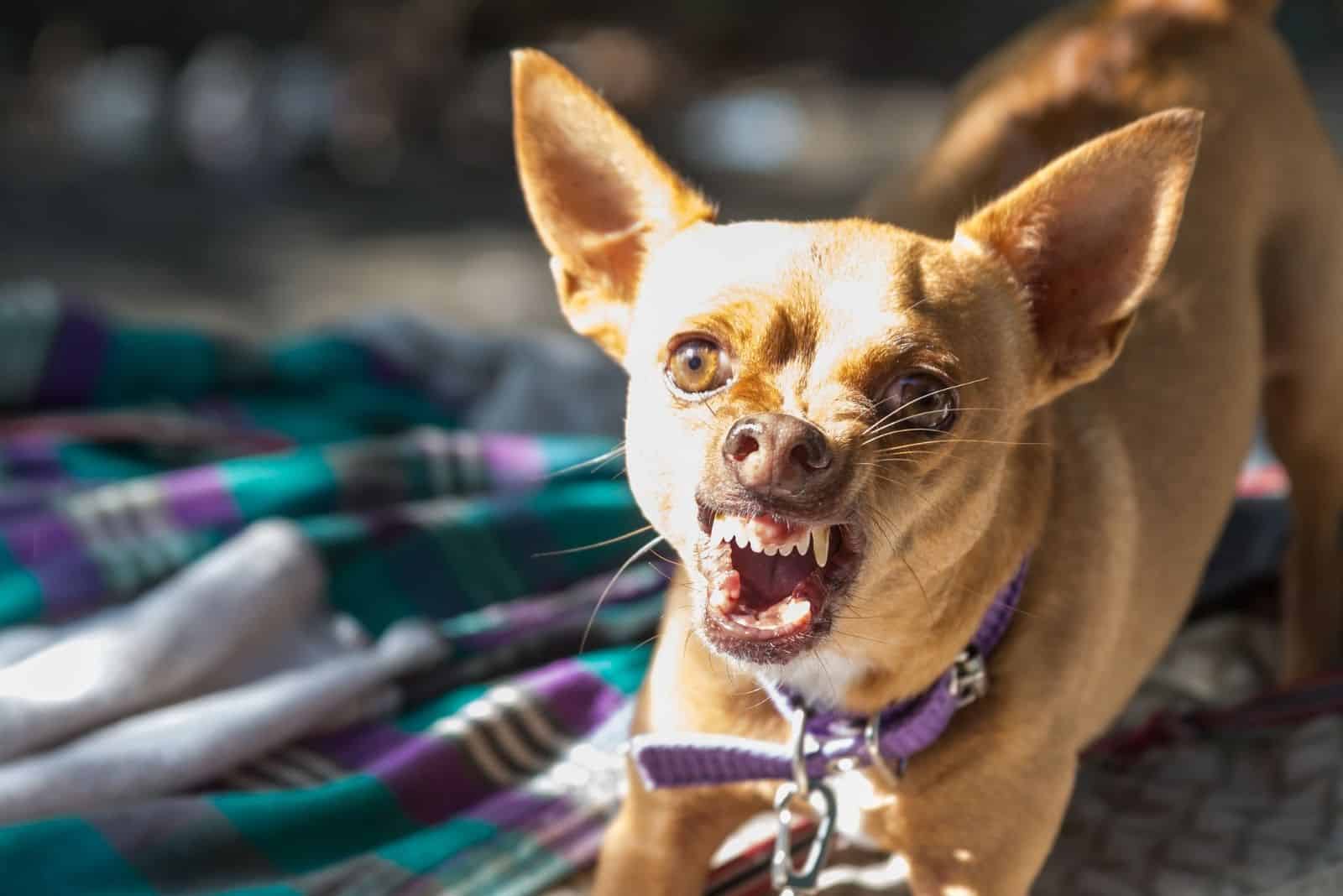
It might be another way of asking, why are Chihuahuas so aggressive? But it’s a question that people ask quite often, so we’ll answer it separately as there are definite links to aggressive behavior.
Have you ever heard of small dog syndrome? Some experts suggest that this is why some Chihuahuas seem to be mean all the time. A Reddit user described Chihuahuas as being ‘made of anger,’ which seems a touch harsh but possibly fair in some cases!
Because of their small size, Chihuahuas may feel naturally defensive. They are weak, fragile dogs with protruding eyes that are easily damaged. These poor pooches get stepped on, tripped over, sat on.
It’s understandable that they can be anxious because they are so small, fearing that they will get hurt. This doesn’t stop them from warning off much larger dogs!
A Chihuahua won’t think twice about facing down a Great Dane. This is a defense tactic to make the big dog think that the Chihuahua is bigger and stronger than it looks. If it can frighten the bigger dog away, then it won’t have to fight and possibly get hurt.
Small dog syndrome isn’t exactly a syndrome, as such. It’s more a collection of behaviors, and not all of them could be described as aggressive. The dog might ignore your commands completely.
They might jump up at people for attention, constantly wanting to be picked up and carried. They might hide in dark corners, break all the house rules, or show resource guarding behavior (growling when anyone approaches their food bowl or favorite toy).
And Chihuahua owners don’t help the situation, as we treat small dogs differently. We are more protective and more lenient when it comes to punishment.
Bad behavior goes unchecked, which then becomes a learned habit. The dog assumes that this is normal and will continue to act this way until you do something about it.
Why are Chihuahuas so aggressive? It’s partly because they are so small!
Are Chihuahuas Naturally Aggressive?
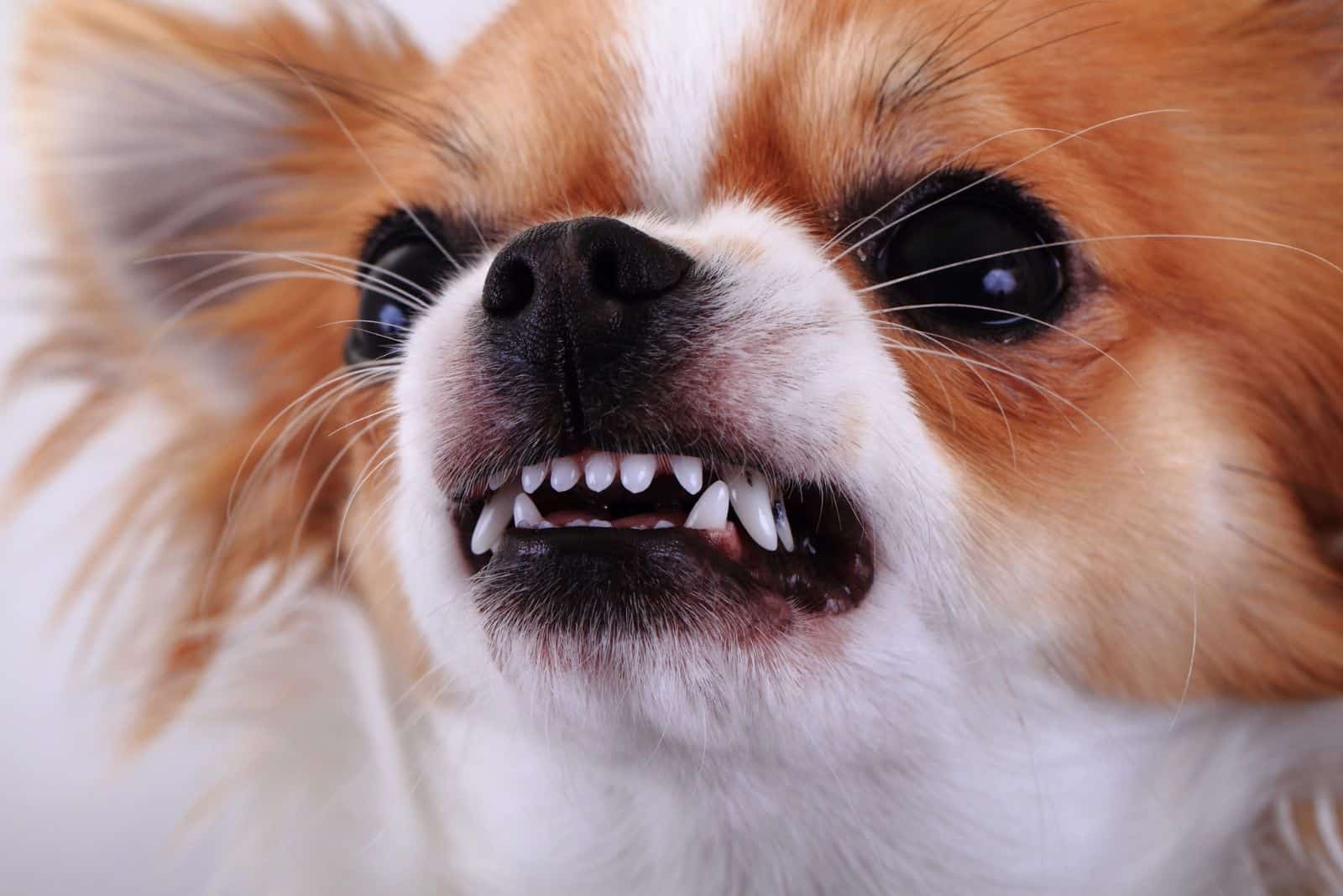
On the whole, it’s unlikely that they are naturally aggressive. All dogs are capable of aggression, whatever the breed. Remember that despite centuries of selective breeding, these animals share about 98% of their DNA with wolves.
It’s hard to believe that the tiny Chihuahua dog has anything whatsoever to do with the mighty wolf, but those instincts are there nonetheless. And because of this, they are highly territorial.
Some breeds have earned a reputation for being aggressive, such as the American Pit Bull Terrier that we’ve already mentioned. It’s fair to say that humans are almost entirely to blame for this – but that’s a separate debate.
It might surprise you to learn that several studies have shown the Chihuahua to be a much more aggressive dog breed than the Pit Bull, with Dachshunds following at a close second. However, because bigger dogs inflict more damage when they attack, the stigma remains.
We’ve touched on one possible reason for signs of aggression in Chihuahuas (small dog syndrome), but does this mean that they are naturally aggressive?
As we said previously, probably not! A Chihuahua puppy might nip or chew your hand. It’s their way of exploring the world and testing their bite strength.
In the wild (or if left with the mother dog long enough), they will be taught bite inhibition. They’re certainly not aggressive.
In most cases, the aggressive behavior will be described as mild or moderate, and there are ways to resolve this problem. Severe aggression is rare in any breed and is usually associated with dogs that have been badly abused or have been specifically trained for aggression because their role requires it.
Why are Chihuahuas so aggressive? It may be because they are territorial.
Why Is My Chihuahua Aggressive To Other Dogs?
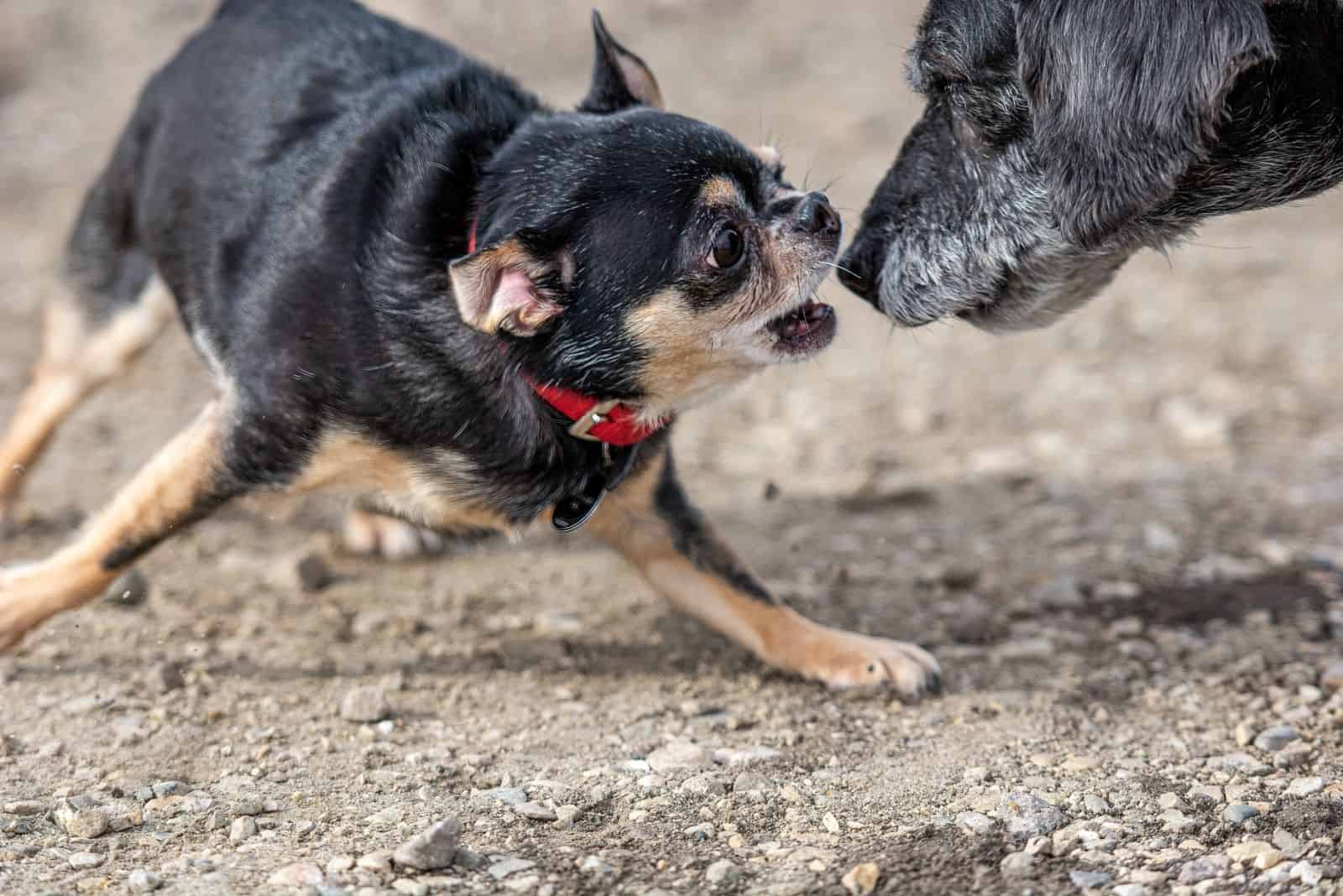
It’s not just Chihuahuas. Many dog breeds can be aggressive towards other dogs, especially when they’re on a leash. Animal behaviorists suggest that the reason for this is because the dog is frustrated at being restrained.
They are uncomfortable and unsure of how to deal with the situation, sometimes resorting to aggression. Without the leash, they would have the choice of escaping danger, so they may be feeling vulnerable.
We’ve already learned that the little Chihuahua often feels threatened by the presence of large dogs, and the addition of a leash adds more pressure. Also, these tiny dogs are fiercely loyal to their owners. They will challenge anyone or anything that they see as a potential threat, however big it might be.
In addition, dogs on a leash are forced into a situation that is unnatural to them. Dogs usually greet each other by approaching from the side and performing the sniffing ritual that we’re familiar with.
When on a leash, they have to approach from the front, which is a classic confrontational movement signaling that they are about to fight.
Off-leash dogs may also show aggression, which is a sure sign that they have a problem. Most dogs will simply greet each other and go their separate ways.
Once again, with the Chihuahua, it may be that they are displaying small dog syndrome. If a big dog approaches them, they might snarl because they are fearful of being hurt.
It could also be that they are being protective because they see the big dog as a threat to you.
Why are Chihuahuas so aggressive? They are feeling vulnerable and anxious, or they’re protecting you!
Why Are My Dogs So Aggressive Towards Each Other?
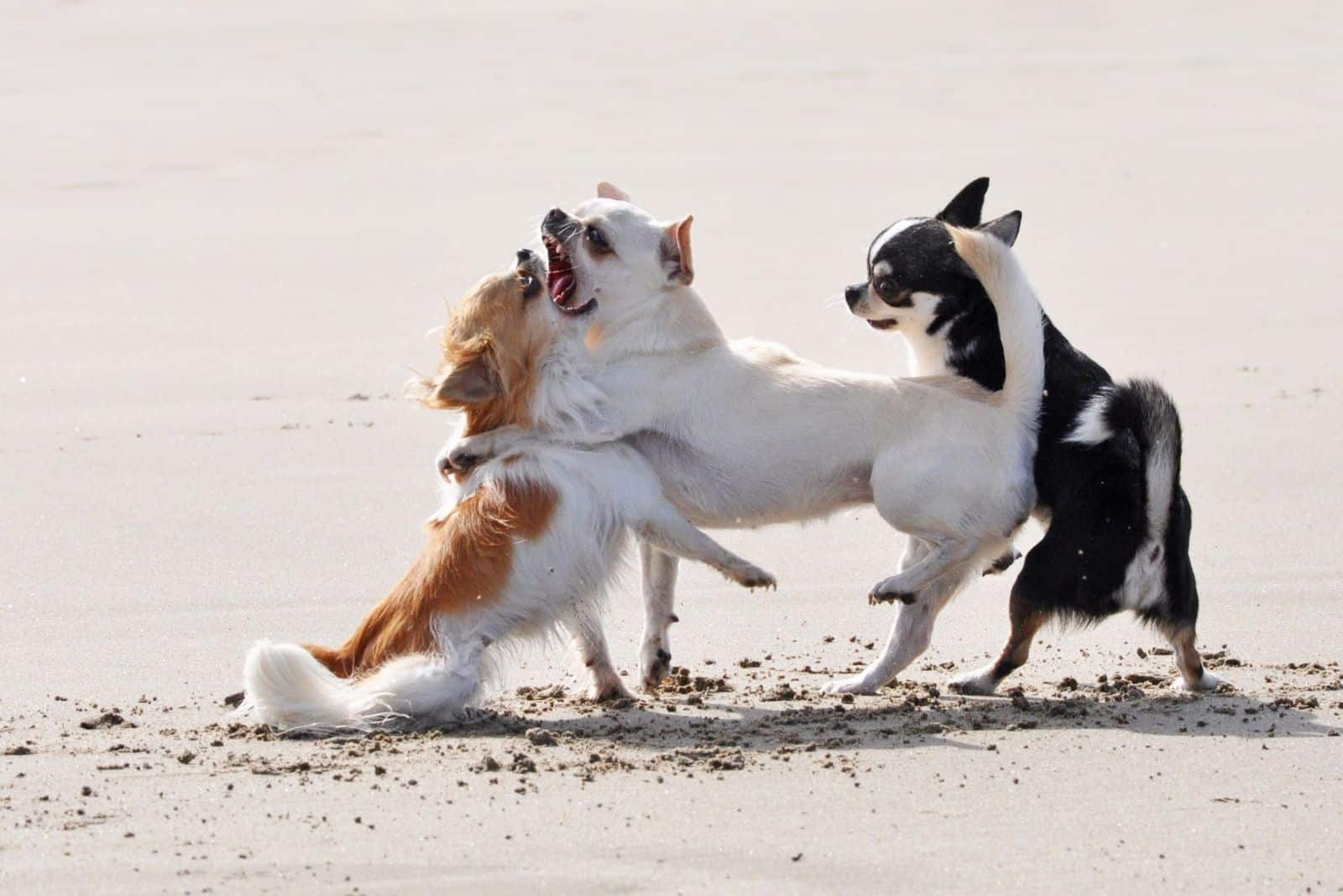
Things can get more tricky when aggression happens between dogs in the home. It’s not uncommon, but it can be very upsetting for the pet parents and unpleasant for the dogs involved, especially if there are injuries.
The main reason is usually a struggle for a dominant position in the ‘pack’ and the desire for attention from the pack leader (that’s you).
Read More: Younger Dog Attacking Older Dog: 6 Causes Of Aggressive Behavior
Certain circumstances might increase the risk of aggression between two dogs in the home:
• Introducing a new dog for the first time
• A family member leaving home or passing away
• A new arrival in the home, including a baby
• An aging dog nearing the end of its life and becoming sick
• The passing of an elderly pet
• Moving house
• Frequent scolding
• A puppy reaching full maturity
• Intact dogs (not spayed or neutered) may display sexual aggression, and whelping mothers might aggressively protect their pups.
Basically, anything that upsets the balance in the home. Our doggy friends are more sensitive to these things than you might guess. The social hierarchy, with you as pack leader, isn’t fixed, and some dogs will challenge this at times.
One thing that doesn’t change is that they crave your attention jealously. If one dog sees another getting more attention, there’s a chance that they’ll protest about it. And sometimes, this involves fighting with other dogs to get it.
Read on to the end for some tips on how you can reduce this risk and get your furry pals to live in harmony.
How Do You Stop A Chihuahua From Growling?
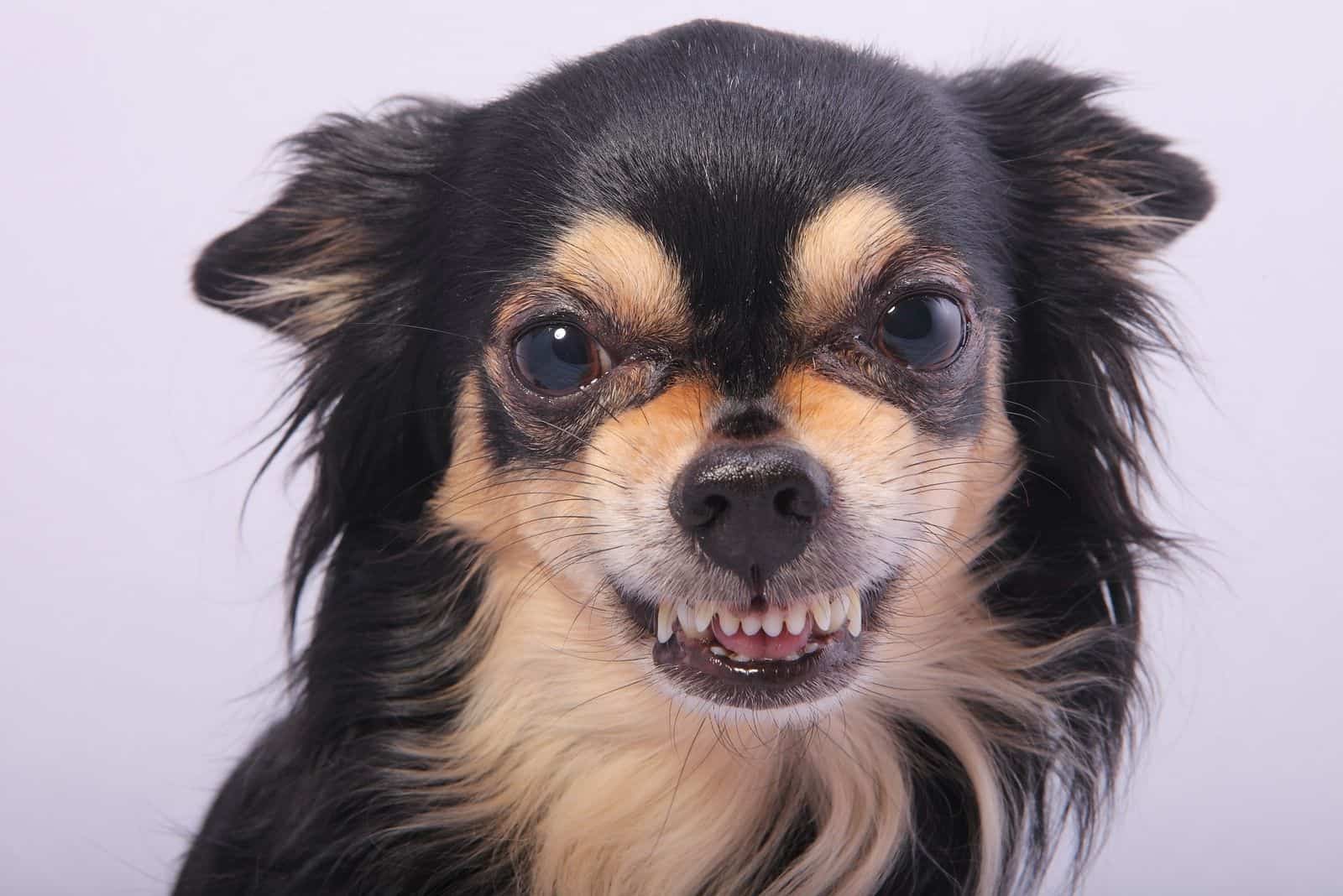
If growling is your only problem, the first thing to do is to thank your lucky stars! It might not be ideal, but growling isn’t the worst thing in the world.
If it really is a problem, try to observe when your Chi is growling. Does it happen at certain times, around family or other people, other dogs, or other animals?
Is it only when particular people or certain dogs are near? Narrow it down if you can to help you understand what or who is causing the problem.
Obviously, it would be more of a problem if your dog is growling at other family members or pets, as you all have to live in the same house.
Whatever the cause, the best way to deal with this is to use redirection tactics. We’ll go into this in more detail in the next section, but what you need to do is to try to ignore this behavior. If it escalates beyond just growling, then you’ll need to change your strategy.
However, when they growl at someone or something, just try to ignore them. Reacting harshly will teach them that growling gets a response from you.
Even worse, smacking or shouting confuses them and gives them the wrong signal – they are more likely to be fearful and turn to more aggressive behavior.
If or when they stop growling, reward them. Positive reinforcement is the most effective way to alter and improve a dog’s behavior.
They soon learn that they will get a reward for acting a particular way. They’ll figure that no growling equals a treat!
Chihuahuas are very food-oriented, so they catch on to this pretty quickly. After a while, you should notice that the growling gradually decreases until it disappears almost completely.
Are Teacup Chihuahuas Aggressive?
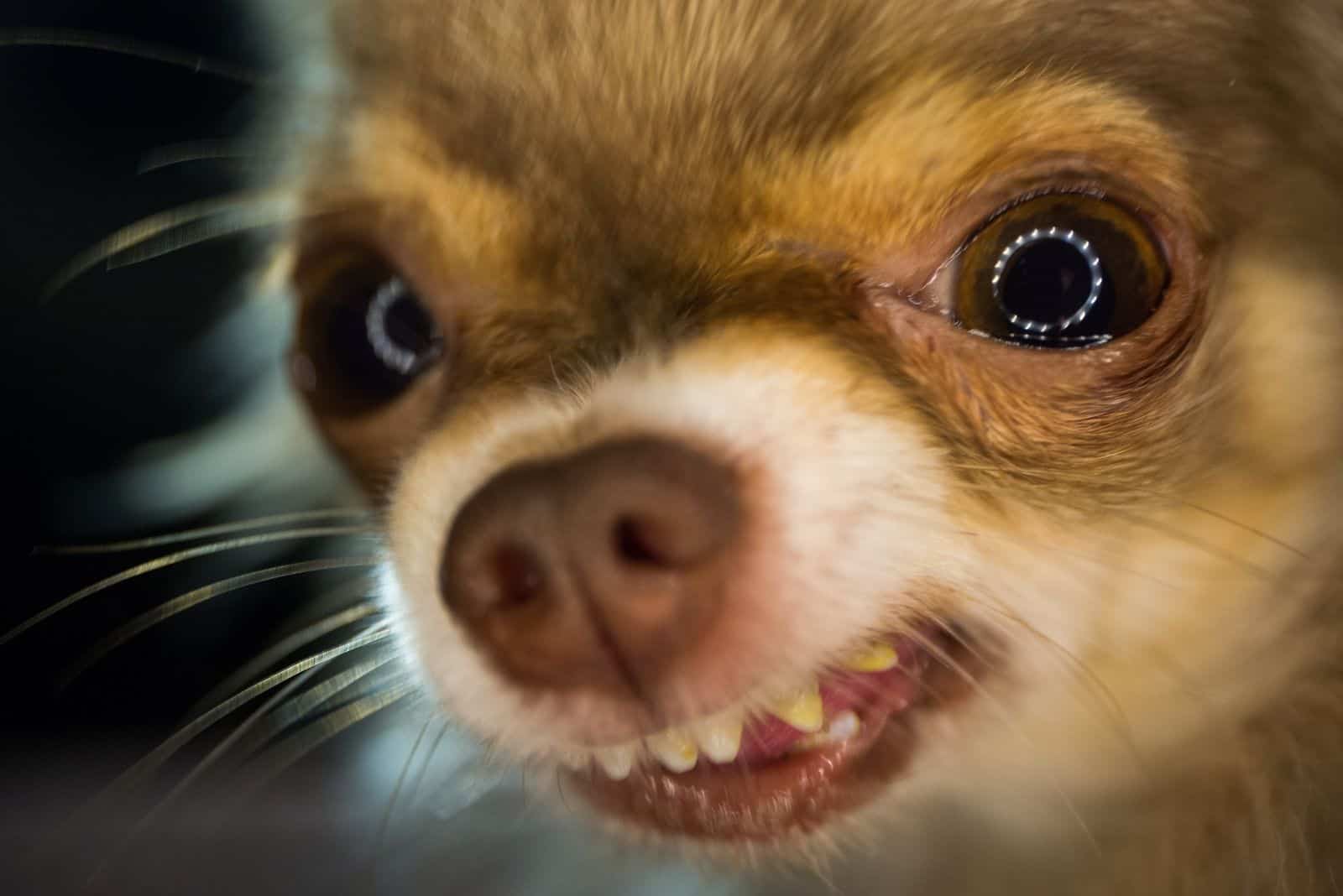
They can be aggressive at times, possibly more so than standard-size Chis.
Teacup Chihuahuas are those that fall below the average size rather than being a separate breed. They take their name from the fact that they can fit inside a teacup!
In all other respects, they are identical to standard Chihuahuas, except that they are more prone to sickness, disease, and injury.
When it comes to aggression, there is a chance that they are more aggressive than their larger counterparts. This is because they will be picked up more often.
Owners will naturally feel a tendency to remove them from potentially stressful or dangerous situations or simply want to carry the dog as their little legs are going too slowly, and they can’t keep up with their owner’s pace.
Also, because they are so cute, people (including strangers) will tend to make a fuss and try to pick them up when they really want to be left alone.
When this happens, the little dog may feel that they have no sense of control, which can make them frustrated. This can result in a show of aggression, including nipping and biting, snarling, or frantic yapping.
Why are Chihuahuas so aggressive? They might be frustrated at having no control over their actions!
Why Is My Chihuahua Suddenly Aggressive?
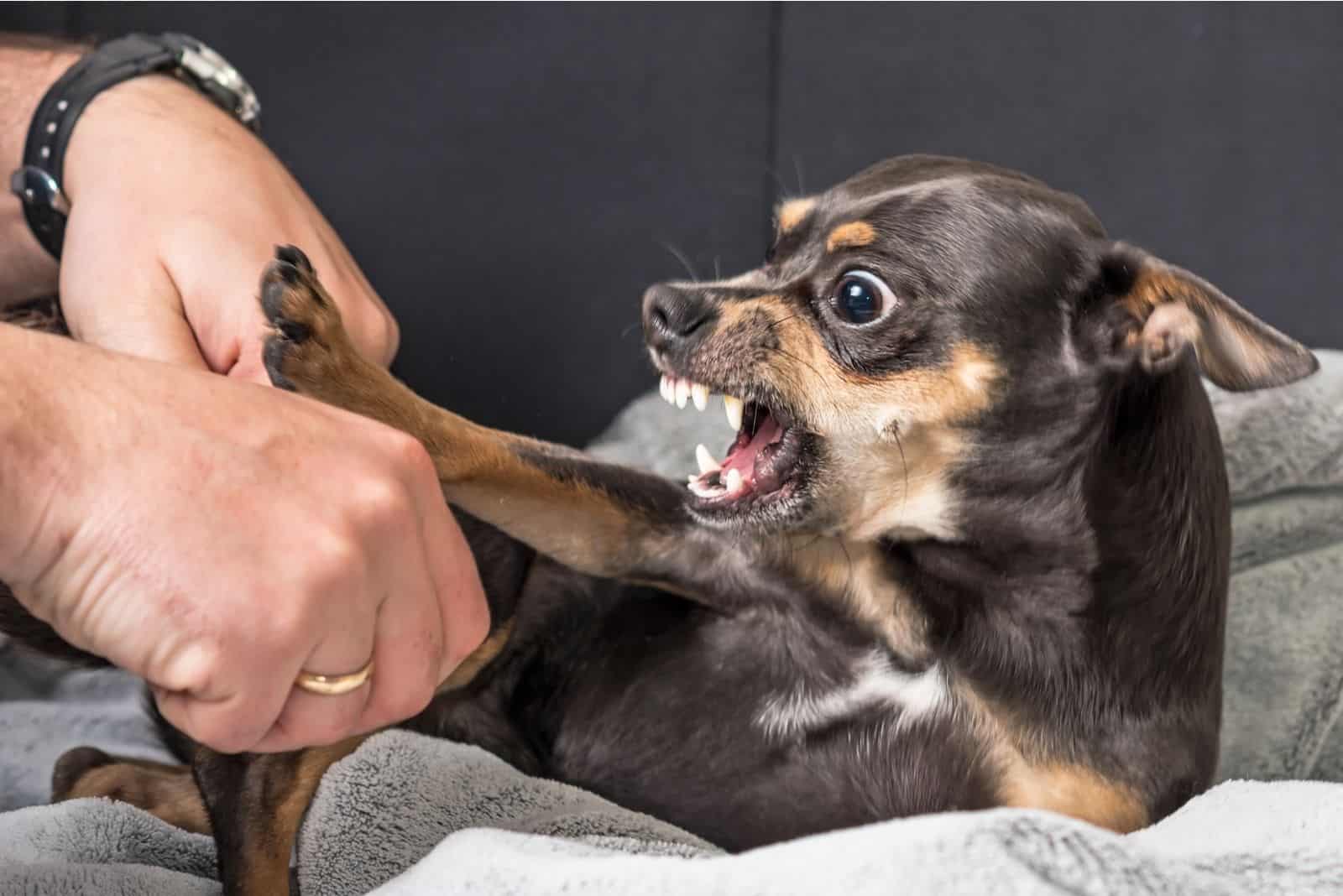
If your Chi is usually placid but suddenly becomes aggressive, then you need to get them checked out by your vet immediately as sudden, unexpected aggression can be a sign of injury or disease.
Illnesses affecting the brain are a common cause of sudden aggression, including tumors, conditions such as epilepsy, or those that cause inflammation of the brain.
Dogs that are in pain may lash out because they don’t understand what’s happening. The aggression isn’t aimed at you; they just don’t know how to deal with the pain.
Very small dogs can easily fracture bones, and when you touch the dog, they may snap at you to warn you off.
Internal injuries won’t be visible but can be extremely painful. Picking the dog up will cause them more discomfort, and they may bite you as they don’t have any way of telling you that something’s wrong.
Why are Chihuahuas so aggressive? They might be sick or in pain.
Top Tips For Dealing With Angry Chihuahuas
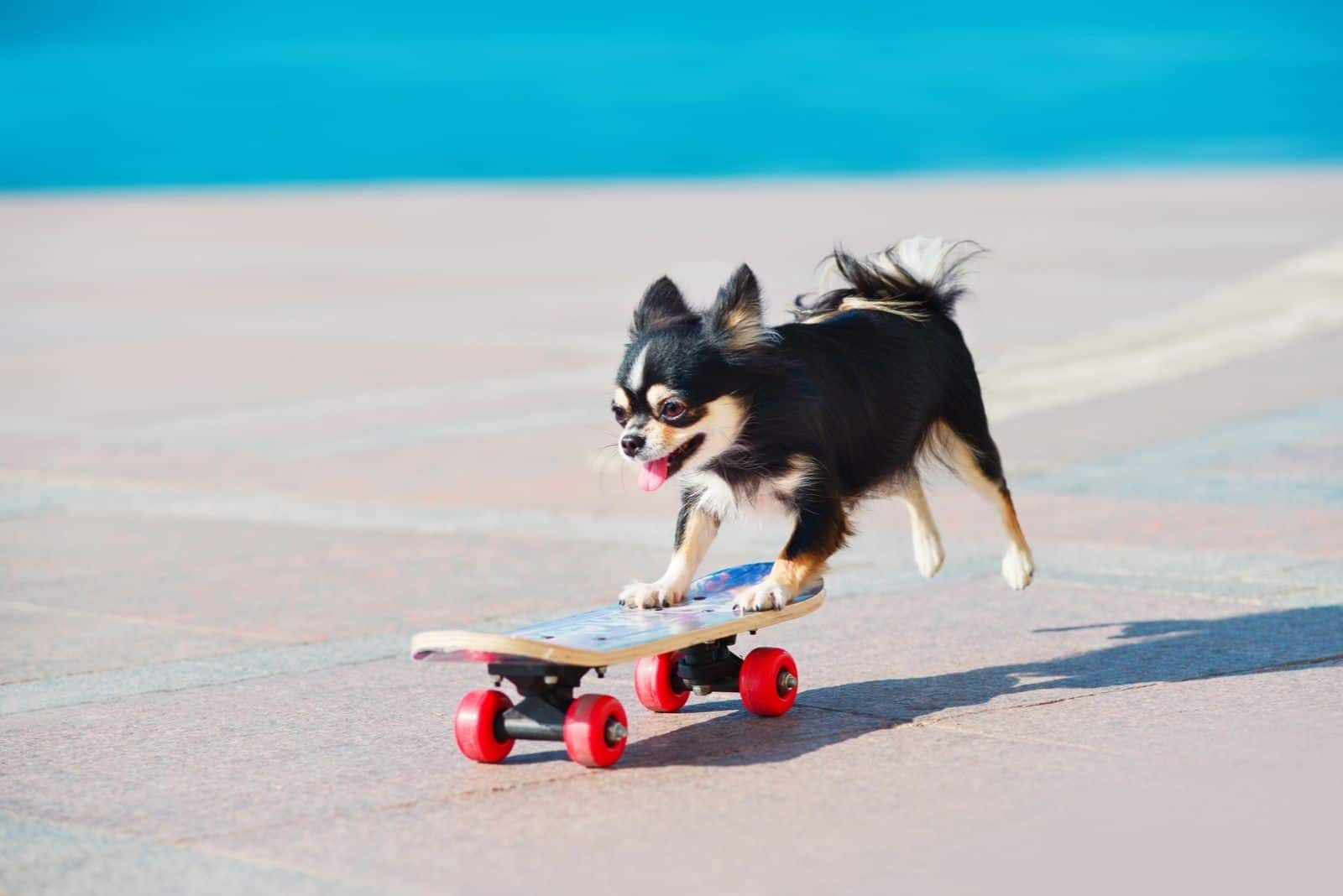
We’ve looked at the question, why are Chihuahuas so aggressive?
And we learned that they are protective, territorial, and feel vulnerable because of their size. In some cases, aggression might be due to pain and discomfort.
Now it’s time to offer some advice on how to stop your doggy friend from displaying aggressive behavior.
Dog Training
It has to be said that a lack of training is probably the number one cause of Chihuahua aggression. All dogs benefit from training, and it is best to start as early as possible before your pup gets into bad habits.
Once they are mature, the task becomes much more difficult.
It is vital to establish yourself as the dominant party very early in this relationship, or your pup will start to take advantage of this. As you go through the training process, your dog will push against your authority, and it’s your job to gain the upper hand.
Accredited dog training classes are a good place to start, as you will feel supported by the trainer and other attendees. By all means, if you feel you can train your dog yourself, then feel free to do so.
However, it makes sense to take advantage of a professional trainer who has the knowledge and experience to help you.
If you don’t use a dog trainer, you need to be prepared to be patient and teach your dog basic commands. It shouldn’t take too long for them to learn a few simple commands, and you’ll find that they will obey you even when they’re angry.
Socialization
This is as important as dog training when it comes to dealing with aggression. Getting your dog used to the company of other dogs when they are young will go a long way to reducing any anxiety when they meet larger dogs when they are older.
If you’re lucky enough to have a doggy daycare center nearby, then take advantage of it! They have qualified dog trainers, agility classes, expert advice and information, and a whole load of doggy pals for your pooch.
Plenty Of Exercise!
Exercise is important for all dogs as it keeps them fit and healthy, reducing the risk of obesity.
It also uses up excess energy, which is essential for their physical and mental wellbeing. Dogs with too much energy and not enough exercise will become bored, frustrated, destructive, and aggressive.
Chihuahuas may be tiny, but they need at least 30 minutes of exercise each day, ideally more. Some experts recommend 45 minutes to an hour, but this depends on their age and mobility level.
Never exercise a puppy too strenuously as it is still developing, and this may cause long-term damage.
However, two or three short, brisk 20 minute walks each day, with a vigorous playtime (frisbee, fetch the ball, find the treat, etc.) or two will be sure to use up all that energy.
Give Them A Safe Space
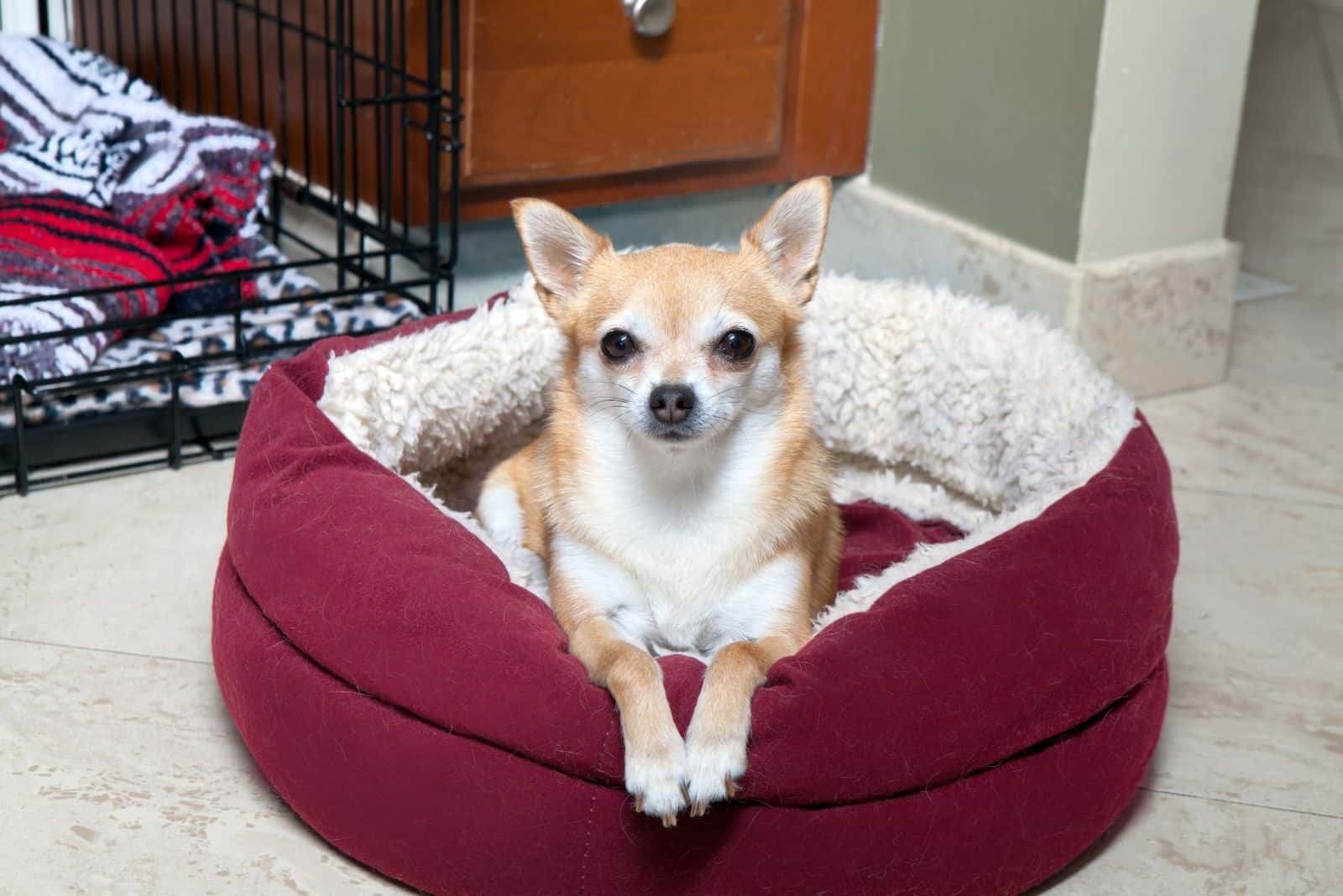
Sometimes they just want to be left alone, so give them their space. You can do this literally by getting them a crate with a comfortable bed or blanket in.
When they feel like having some ‘alone time,’ they can trot away to their crate and chill for a while!
Make sure they have a bowl of fresh, clean water and their favorite toys. Keep the door open and always reward them for staying in the crate.
This is important as it gives the dog a sense of control, which reduces anxiety.
Positive Experiences
As far as possible, make time to treat your dog to a wide range of fun, new experiences. This is especially important for Chihuahuas that have been abused, often at the hands of children. They need to be taught to trust humans (and kids, in particular) once again.
So, make a plan of different activities that your dog will enjoy, and reward them at the end. It’s a great way to show them that they are loved and help them to relax in a whole range of circumstances.
Mental Stimulation
Bored dogs are easily frustrated. And frustrated dogs can become aggressive!
You’ll come across hundreds of doggie websites that suggest that different breeds are more intelligent than others, but the truth is, all dogs are pretty smart, even though the Chihuahua is positioned at 125th out of 138 in the list of smartest dog breeds!
They still need mental stimulation at some point in the day, or they will become bored.
We’ve already mentioned exercise, but your dog can get some stimulation from a walk around the neighborhood. It’s a change of scenery with new sights, sounds, and smells. They might meet friends old and new in the dog park.
You can also get them special puzzle toys or treat-dispensing toys that will keep them entertained. Set aside some time to play with your dog, as this stimulates them and strengthens the bond between you.
Spaying And Neutering
It’s not a cure-all solution, but having your dog spayed or neutered can significantly reduce aggression. All those pesky hormones that slosh around in that tiny body are no longer an issue, and the dog will be much calmer.
As an added bonus, you won’t have a surprise litter of pups to deal with.
In Conclusion
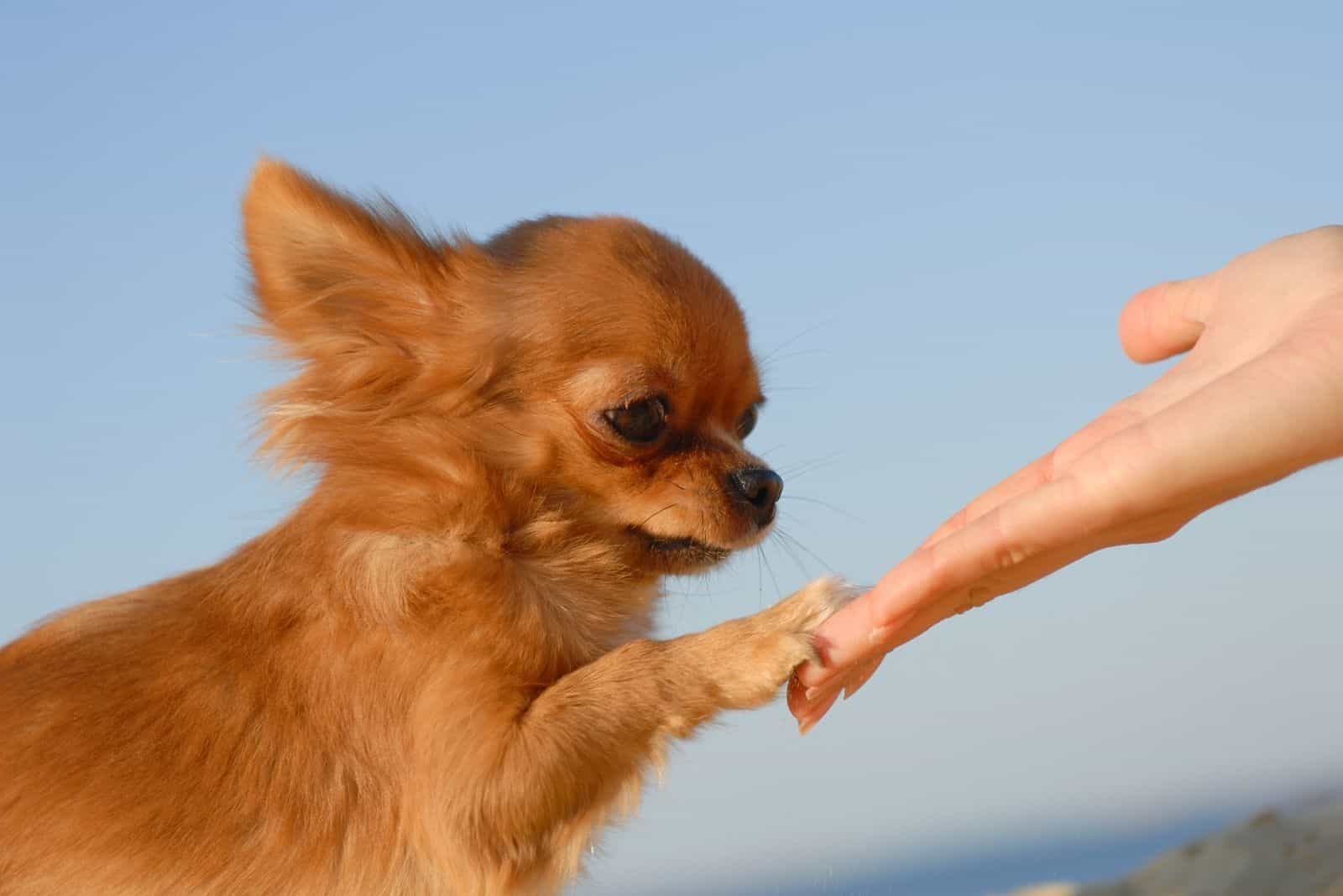
Although studies show that Chihuahuas are more aggressive than most other breeds, we’ve seen the reasons why this might be. They’re not likely to cause a lot of damage, but it isn’t much fun having a dog that’s made of anger.
The key to changing this lies in early training and socialization, as well as showing some understanding. Your dog is devoted to you, and it wants to protect you.
It also wants to protect itself because it feels vulnerable. This dog needs to be loved, but it also needs its space.
Give them space, exercise, and stimulation. Introduce them to as many people and other dogs as possible when they are young. Reward them for good behavior and never use harsh punishment as this is counterproductive.
Nobody wants an aggressive dog, but you (obviously!) still love them and want to help them to be calm, happy, and peaceful. Using these tips, you might be able to do just that.
Read Next: Why Chihuahuas Are The Worst? 21 Reasons
